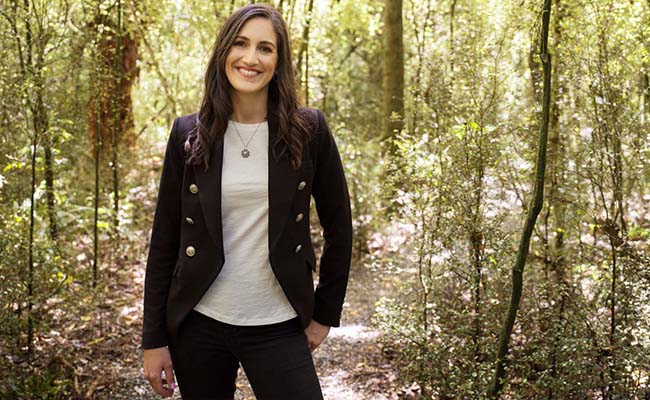Tuesday 30 November 2021 8:42am

Dr Olivia Harrison has been awarded the 2021 L’Oréal-UNESCO For Women in Science fellowship.
Receiving an international fellowship and being able to use the $25,000 award to further her studies into anxiety and mental health “means the world” to Dr Olivia Harrison.
The Department of Psychology researcher has been awarded the annual 2021 L’Oréal-UNESCO For Women in Science fellowship.
“At L’Oréal, we have the responsibility to support the incredible work of women in science and we are excited to contribute to the work of Dr Harrison. Her research is already making a difference in the way we perceive and treat anxiety symptoms, and she will no doubt continue to make vast advancements in the different ways we understand and treat mental health in the future.”
The funding will support her ground-breaking studies into how individuals perceive symptoms of anxiety, such as a racing heart, shortness of breath or sweaty palms – and how their response to this perception can further influence one’s mental state.
“It can be challenging to secure funding to advance scientific research, so receiving the L’Oréal-UNESCO For Women in Science fellowship means the world to me.
“Mental health is something that impacts everyone, and my hope is to use this funding to make a real difference to those who may be struggling.
“The structure of the fellowship allows me to secure the specialist set-up that we need to run our breathing experiments – equipment that we wouldn’t be able to purchase otherwise,” she says.
With one in four New Zealanders at risk of developing mental health struggles, the issue is receiving increasing attention from prominent figures, medical professionals and sufferers alike. While anxiety affects everyone to some degree, both women and younger people are particularly vulnerable.
“We know certain levels of anxiety can be healthy for things such as self-awareness, but as society continues to evolve, we are seeing anxiety occur at more disabling levels, and our coping strategies and treatments are lagging behind,” says Dr Harrison.
The topic is of both personal and professional interest to Dr Harrison, who knows what it is like to experience high levels of anxiety. She wants to help address some of the gaps in the way individuals identify and perceive signals from the body, to aid the development of better treatments and techniques to help manage the symptoms.
“Anxiety is unique to every individual and needs to be treated as such. The treatments that work well for some people, do not work for everyone. We also know that many common treatments don’t always stick, and it may be because we are not giving people all the necessary tools for their specific anxiety profile.
“Understanding your own personality may help provide insight into how and why we worry, and which strategies might help us best manage both our thoughts and symptoms,” says Dr Harrison.
While the Kiwi scientist’s research to-date has focussed on the way the brain processes breathing perceptions, and how this might be changed with greater levels of anxiety, her upcoming studies – supported by the L’Oréal-UNESCO For Women in Science fellowship and the Rutherford Discovery Fellowship awarded by the Royal Society Te Apārangi – will look at how treatments such as exercise and anxiety medication may help improve symptom perception. This knowledge will help us create innovative and tailored treatment plans for individuals in the future.
Dr Harrison was selected by an independent panel of science and research representatives to receive the fellowship, which recognises the achievements of exceptional early-career female scientists.
L’Oréal New Zealand’s Country Manager, Aurelie de Cremiers, is proud to be able to award Dr Harrison the fellowship.
“At L’Oréal, we have the responsibility to support the incredible work of women in science and we are excited to contribute to the work of Dr Harrison. Her research is already making a difference in the way we perceive and treat anxiety symptoms, and she will no doubt continue to make vast advancements in the different ways we understand and treat mental health in the future,” she says.
Together with four Australian-based fellows, Dr Harrison will attend a virtual ceremony to celebrate her outstanding achievement on December 1.
Kōrero by Ellie Rowley, Communications Adviser (Media Engagement)
